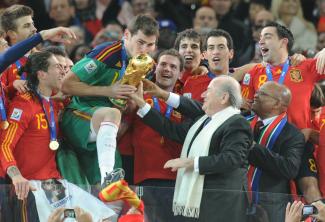Sports
South Africa 2010 – Germany 2006

Four years earlier, in 2006, Germany had hosted the World Cup and promised to support its African successor. The governments of both countries, among other things, committed to implementing the project “South Africa 2010 – Germany 2006: Community partnerships with kick”. The project was initiated by ENGAGEMENT GLOBAL’s Service Agency Communities in One World and was designed to support South African host cities through an exchange among experts.
Host cities face many challenges. FIFA, the International Federation of Association Football, insists on very high standards to ensure that international visitors enjoy a safe and pleasurable event. Some of these standards – for instance relating to stadium comfort – are hard to balance with a city’s own development plans. At the same time, the World Cup is a huge opportunity for urban development because municipal authorities get extra funding that federal and state governments would otherwise never afford. World Cup cities try to use such funds not only to meet FIFA standards, but to improve their and their people’s long-term outlook.
From 2007 to 2010, German World Cup experts participated in consulting missions and workshops in South Africa. They tackled issues like security, transport and traffic. Fire brigades and emergency-service providers, for example, shared their views on security. Organising teams discussed how to design fan events and stage cultural shows. Obviously, the concepts developed for German cities could not simply be copied in South Africa. Accordingly, the project was designed as an exchange among colleagues, with the goal of passing on hints and experiences.
Both South Africans and Germans found the project very valuable, and people on both sides improved their professional skills. Those who were yet to host the World Cup applied their new insights immediately. In some cities, for example, disaster prevention and environmental protection improved. German participants benefited too, however, by expanding their skills in consulting and intercultural communication.
All twelve German host cities and nine South African ones participated in the project, and so did ministries and security authorities. The project in South Africa was so successful that EG and GIZ initiated a second cooperation project along similar lines: “Brazil 2014 – Germany 2006: Host City Programme: Partners for Sustainable Urban Development” (see interview).
Kurt-Michael Baudach,
Service Agency Communities in One World, ENGAGEMENT GLOBAL







